|

songs | interviews | photos | tours | boots | press releases | timeline
Alternative Press (US)
July 1998
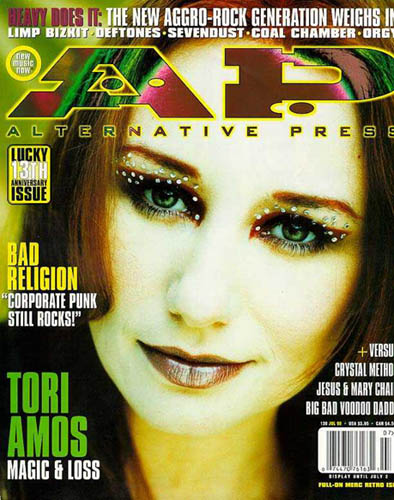
Tori Amos
Magic & Loss
A miscarriage prompted Tori Amos to consult her pantheon of gods and goddesses for answers regarding loss and the fragility of life. The result is her most passionate and profound album to date, From The Choirgirl Hotel. David Daley checks in on the latest chapter of the singer's complex life.
Photos by Lee Locke.
TORI AMOS GETS RIGHT TO THE POINT.
We've been chatting for maybe five minutes, making introductory small talk in her suite at Atlanta's Ritz-Carlton hotel during an early stop on her pre-album-release tour of small clubs. She starts sipping her tea (loaded with ginger and just a little lemon) after positioning herself comfortably on the plush couch, her Raggedy Ann ringlets framing her red, cherubic face; her overalls and white t-shirt a casual contrast to the opulent Ritz decor. And then she starts talking openly and with great emotion about the pain of her miscarriage just 16 months ago.
"I lost the baby two days before Christmas - Dec. 23, 1996. The doctors had just told us that we were out of the woods," she says, sadly but surely. "You know how they say motherhood changes your life? Well, in my case, non-motherhood changed my life.
"[Bearing a child] is the most natural thing that you think you can do as a woman, and when it all goes wrong, even if it's something that happens to a lot of women, it's really hard to put it somewhere," she says. "You can't go back to being the woman you were before you carried life. But you're connected to this being that's never been in physical form."
So Amos surrounded herself with family, staying in Florida, where her parents recently retired, rather than returning home to England. She cried a lot. The hurt was so massive that some days it was all she could do to walk to the tiny wooden dock attached to her family's river-front house. She'd spend hours there, trying to make sense out of tragedy, and trying desperately to commune with what should have been her daughter. And in the stillness, she listened to the rhythm of the water.
She wasn't thinking about music, though. When Amos learned she was pregnant in the fall of 1996 following the 180-date Boys for Pele tour, she planned to take some time off to be a mom. But following the miscarriage, music brought her comfort where family, friends and faith had failed. The result is From the Choirgirl Hotel, her most passionate and profound album yet, in a career that has repeatedly turned the most brutal tragedies and disappointments into intimate, brave, cathartic music.
"You know when you've cried and cried, and you really cant cry anymore, so you're very quiet?" says Amos. "I started hearing the water. And 'Pandora' - the last song on the record - came to me. She was sort of warning me that there are so many feelings under the rocks that I needed to turn into. She told me, 'You need to dive into this one, Tori, because your healing is in there. Once you go, it's a whole new journey, but you've got to metaphorically leave this little dock and come with me to find out what's really in this ocean of feelings.' So I did. And that's where I met these songs," she says. "I knew I wasn't going to find a lot of answers from philosophical camp, because it's empty. What started comforting were the songs."
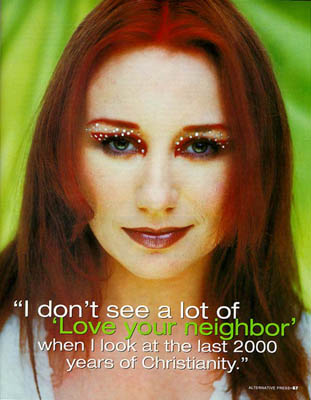 BUT LET'S NOT GET too far ahead of the story. Amos had a long history not just with the songs, but with that philosophical camp.
BUT LET'S NOT GET too far ahead of the story. Amos had a long history not just with the songs, but with that philosophical camp.
She was born Myra Ellen Amos in 1963 to rev. Edison and Mary Amos, the daughter of a North Carolina minister and his half-Cherokee wife. Her paternal grandparents were Pentecostal ministers, and Amos remembers them as always praying. She even once witnessed them speaking in tongues.
Amos spent her childhood both playing piano and arguing about religion with her family, especially her dad. Perhaps the biggest debate was over the Virgin Mary. Tori argued that the Catholic Church took away Mary's power and created serious sexual guilt by portraying her as a virgin.
"Basically [the church] is saying that a woman doing the real stuff, the stuff we do, doesn't create special boy prophets," Amos says. "What does that say? Christianity has no penis. Think about it. If we're saying that this deity gave life through Mary, there's no semen. Where's the penetration? Where's the insertion? Where's the union? There's no man and woman to create this Christ being.
"[Christian men] have got to talk about the penis because they've got one, and they're using it. But that's the problem with Christian men, - they haven't known where to put it! The shame that they cast on the women - 'You tempt us to do this' - that's because they don't think they have the right to put their penis somewhere. So they've taken the sword and gone from country to country slaughtering people to believe in Christianity. I don't see a lot of 'Love your neighbor' when I look at the last 2000 years of Christianity."
You can imagine what the discussions were like in the car when Rev. Amos drove his daughter to Georgetown's gay bars to sing as a teenager.
"The funny thing is, my father's becoming liberal now," marvels Amos. "It's just fascinating. My nieces and nephews have no idea their grandfather was such a Victorian - no short skirts; stay a virgin until you're married. 'Gird your loins' was his favorite saying. Now he sounds like Alice Walker. At 70 you go, 'Glad it's happening; wish you were there.' He has no idea how rigid he was 25 years ago, and I don't have the heart to tell him."
The prodigy.
Reached in Florida, Tori's dad laughs at that assessment.
"Do you know any Methodist ministers who would take their daughters to sing in bars?" he asks. "I took a lot of criticism for that. Other clergy thought I was sinning, driving my daughter into dens of iniquity."
Indeed, Amos' parents nurtured her piano talent and quite astutely helped guide her career. They recognized her talents early, when young Tori still thought she wanted to be a ballerina. She started playing before she turned 3. By 4 she knew Mozart concertos. The next year they brought her to Baltimore's renowned Peabody Institute at Johns Hopkins University so she could receive formal training and instruction in theory. But Peabody and the other elite music schools taught strictly classical composition the and the strong-willed pre-teen prodigy wanted to play her own songs.
When Amos presented her material to the Peabody examination board, it gave her the boot. Still, one Peabody instructor, upon hearing those songs immediately realized that Amos would be successful someday and kept working with her.
"I always did think she'd be important. I knew that she could make it in the music industry. I just didn't know how," says Pat Springer, who gave Amos private lessons after she left the conservatory. "She could play Beethoven sonatas wonderfully. One day during practice she asked if she could play her own songs, so I dragged my kids down to listen, kicking and screaming. We were all totally blown away."
Only Tori became bored. Her father, sensing that his daughter was losing interest, offered to find her work. In his clerical collar, he brought her to almost every hotel lounge and piano bar in DC's Georgetown section, and found her regular gigs at gay bars like Mr. Henry's and Mr. Smith's, playing to closeted congressmen and assorted drag queens. Since Tori was too young to enter the bars herself, Rev. Amos chaperoned her himself until she turned 15.
"I think my clerical collar helped," he remembers. "I don't think the people who ran those clubs knew what to make of me."
Tori played the Neil Diamond-and-showtunes circuit for eight years, while her father sent her demo tapes to every record company. Atlantic eventually expressed interest in signing her, even though the label didn't know what to do with a sensitive piano balladeer in the heyday of '80s hair-metal, according to Rev. Amos. "They weren't sure what Atlantic could do with actual talent as opposed to a 'real rocker," he recalls.
Tori, convinced that one more Judy Garland number would send her over the rainbow, signed the proffered Atlantic deal and moved to Los Angeles in 1984. She was 21. After playing with bands in hotel lounges in that town as well ("Problem was, she played with people on dope and everything else," says Rev. Amos), she started a metal-chick - big hair, spandex and thigh-high vinyl boots - band of her own, Y KANT TORI READ, and released one self-titled album in 1988. It's now the most sought-after cut-out-bin record of all time. It sold fewer than 10,000 copies, but it now fetches more than $200 from collectors. The reviews were brutal. Billboard called Tori a bimbo.
"I was just chasing the industry," she says. "You just get so tired of your work being rejected. It was about belonging. It was a time when my individuality wasn't working for me - or so they said - so I cut it out. Then you realize that you're not guaranteed anything else but your individuality. You know you can at least wake up with that and your self-respect. When things do happen for you, you're very appreciative, and also you know how bad it can get."
Comedian Sandra Bernhard saw through the spandex, though. Instead of Y KANT TORI READ, perhaps obsessives should seek out Bernhard's 1985 debut I'm Your Woman, which features Tori on backup vocals. "Tori has always expressed an immense amount of talent," says Bernhard. "You can see it in her eyes and in her heart. That's why I asked her to sing with me on my first album. She is truly blessed."
Amos won't discount those days; she says nothing could have been a more valuable learning experience. "It's the reason I think I'm still here today, and on my fifth record, with some bit of sanity," she says, admitting that she saved photos from that phase as well.
"You've got love 'em," she says, grinning. "I was having fun trying to see how tall my hair could get. But that was the time: the girls and their hair, the boys and their black eyeshadow. You know what it is? It's totally from Romy and Michelle's High School Reunion. I adore that movie!"
She laughs and does her best Lisa Kudrow impression.
"Duh!"
As her father recalls, Y KANT TORI READ devastated Tori. "You don't like any record to fail. But we tried to teach her that sometimes a good failure is the best success. What it did for Tori was send her back to her piano."
It also sent her back to face her past and the sexual guilt from her Catholic upbringing, as well as her nightmare experience as a victim of acquaintance rape. She describes 1991's Little Earthquakes as a first kiss, a woman in her late 20s finally finding her own voice. Three years later, Under the Pink, a precious and profane collection of postmodern torch songs, dealt with her women issues. In 1996, Boys For Pele took on the men in her life.
You'd think that Rev. Amos might not have been so thrilled hearing songs about his daughter masturbating in her room while he conducted church meetings downstairs ("Icicle"), or hearing her sing "Every day I crucify myself" or "I think the Good Book is missing some pages" - let alone the whoops of applause that line brings every time Amos sings it live - but that's not the case.
"I think she's the contemporary female Mozart of this century and perhaps the next century, in terms of her genius," says her proud father. "Little Earthquakes and Under The Pink are both about personal catharsis, helping herself and other young people work through the different structures they were reared in and rebelled against - family, religion, culture - the whole matrix of growing up. Sure, they're going to kick it some. Then they develop their own philosophy of life, which usually comes with some sort of faith systems that's a mixture of all these different influences."
Don't call Tori's songs confessions. She doesn't want anyone's absolution. And don't assume that her songs are even entirely autobiographical, though there's a piece of the writer in most of them. And don't overlook how sharp and hysterically funny she can be. Amos is slanted and enchanting, at once wise, witty and wacky, even if her Tori-speak once got her labeled a "24-carat fruit loop" by one critic.
"It's always about trying to capture an essence," she says of her songs. "Perfumeries are killing themselves trying to do that. What is the essence of passion? What is the essence of lust?
"For me, it's garlic. Garlic and butter," she says, throwing her head back, arching her back deep into the chair and moaning softly. "Garlic butter. Escargot. Mussels and a good bottle of cabernet." She's practically purring now. "Because when it's good, David..." I lean in closer. "When it's really good, the savory is so close to the sensory."
"Is food your favorite obsession?" I ask. Amos' eyes gleam wickedly.
"No," she says, grinning. "It's just a smokescreen for my favorite obsession."
"Which would be?"
She takes a perfect pause. "Comparative religion."
Of course, she's only half-kidding. What Amos does best is meld the sensual and the spiritual. The cult of Tori - her album go platinum with only the barest radio play - worships the singer's public battles with sexual shame and sexual desire, both the products of her religious upbringing.
"I believe in the Great Spirit," Tori says of her personal religious beliefs. "I believe Mohammed exists; I believe in Buddha; I believe in Aphrodite; I believe in Rhiannon. All these beings exist. But the Christian God - he's a bit cheeky. I do hang out with him a lot, and I bring my grievances to him. Everybody has their own relationship with the divine, and all these beings are part of the divine.
"But we are, too. We're all trying to learn our gig. A god is only a god. They're not a woman, and they don't know what a woman feels. Of course, I think gods can desire human women, and I think goddesses can desire human men. There is that need for exchange. The hierarchy is the problem - even with deities. This is just that deity's gig. They're a deity, and they might know more stuff, but what I'm feeling at this moment in this girl's body is valid."
If ever Tori needed to trust her faith and her feelings, it was after her miscarriage. That's the story of From The Choirgirl Hotel. More than a song cycle about losing her baby, it's an album about what happens at the depths of depression. It's about questioning every feeling, demanding answers when there are none, and coming away with a resilience and self-understanding, and a powerful respect for the fragility of the life force.
"On this record I really spent time with sorrow, and I realized that she's got a shoe collection, too," says Amos, in a classic piece of Tori-speak. "She can tell jokes like nobody. Her view isn't always about tears, but she knows tears. She understands them. But she's really comfortable putting her feet off the dock with me in the water, looking at the jellyfish and finding the beauty. I think in the end this record is very much about dancing with sorrow."
But before she could dance, Amos had to rage.
The anger is in the swirling rhythms of "Spark," in the vicious grind of "iieee" and "Cruel" and in the thundering crescendos of "Black-Dove (January)." Amos owes as much to Led Zeppelin, Prince and Nine Inch Nails as she does to Kate Bush and Joni Mitchell (the usual tired comparisons she receives). But Choirgirl Hotel fully transcends any self-absorbed piano-girl pigeonhole and places her in the company of modern-rock visionaries such as PJ Harvey, Trent Reznor, Bjork and Billy Corgan - epic songwriters working on the biggest scale with the grandest themes, but with an intensely personal, unique vision.
Tori's lyrics stare unblinkingly into the void of a woman who has lost her baby, and do so without the elliptical vagueness of the early records. On Choirgirl Hotel she's direct, vulnerable and enraged. "If the divine master plan is perfection/Maybe next I'll give Judas a try," she hisses in "Spark," and it's the sound of faith falling apart.
"You hear stories about angels that come and save certain people," Tori says. "They're beautiful stories. But what about the mother whose kid gets taken away and never comes back? What were the angels smoking when that happened? What do you say? That their kid wasn't worthy? That it's all for the best? Or God has a plan?
"So these questions, of course, I was putting towards every deity I could find. I was quite vicious, and I think 'Cruel' and 'iieee,' especially, came out of that," she continues. "It was almost liberating for me - that it's all in order that I have anger towards the way of things, and just to say, 'Thine will be done' just doesn't work anymore. It's hollow.
"There weren't a lot of answers for why some mothers lose their children and other women are beating up theirs in the mall in front of you," she says. "It doesn't make a lot of sense sometimes. Especially when people call it 'God's will.' If that wasn't the philosophy - if it were looked on as, 'Oh, well, it's a feeble planet and there are no guarantees,' that's one thing. But if it's God's will that I lose mine, then why is it God's will that these are being beaten? If that's God's will, I really need to have a margarita with him.
"When you start talking to people who have that kind of loss, somebody piping up going, 'Well the angels were there for us during this time,' well that's beautiful. But people have to understand that they're not there for everybody all the time. They get lost on the way. That's why in 'Cruel,' when I say, 'I don't know why,' I really don't know why I can be cruel. I don't know why the angels aren't there for everybody, but they're not."
But these songs aren't just about the pain of not being a mother. Amos married her sound engineer, Mark Hawley, earlier this year, and "Jackie's Strength" and "Hotel" deal with the confusion and delight of finding lasting love.
"This wonderful boy had asked me to marry him, and of course I said yes, but I was shocked," Amos explains. "You know, there was a part of me that had sworn that would never happen. You fantasize about what it would be like on that day, and then you fantasize about never having that day. Then you're a vigilante and you will never have it. Then, all of a sudden, there it is, and you're wondering, 'Are we going to make it? Half of all marriages end in divorce. Is that us?' That was all going on as I got lost on my wedding day." Then in 'Hotel' she says goodbye to someone she perhaps might have married. "I think as you're getting married, all the loves, even the 10-minutes loves, are popping up. 'Hotel' was really like feeling like an agent - a spy - in that he was the greatest guy at one time and they were giving me time behind enemy lines. Even though she knows they can't be lovers because it's a whole other life, she just can't let him go.
"That's the thing about letting old lovers go. You don't stop loving some of them," she says. "There are a couple you love no less than you ever did. Not to mention names...but I'm still in love with a couple. You're not going to try to make it work again, but if they needed you, you'd drop everything."
It's also a very sexual album. This Choirgirl Hotel ain't no rustic bed and breakfast. Despite her doubts after miscarrying, Amos never stops being a woman. Just as she criticizes the Catholic Church for not recognizing female sexuality, Amos refuses to give up her sexuality simply because she became pregnant. The Prince-ly funk of "Raspberry Swirl" is the best metaphor for oral delights not coined by the Artist.
"The animus in me is 'Raspberry Swirl.' I'm in love with my women friends, but I just don't eat pussy," says Amos, laughing. "But I'm in love with them. If I had a different sensibility, then you know I think I could, you know, really fulfill someone down there, where a lot of men in their loves don't. And eating pussy is a metaphor, too - it's about crawling in there, being with their juices, really being with them."
Likewise, her "Playboy Mommy" would do anything for her kids. Amos sees her as the dark angel, a warrior woman, much like herself.
"I saw her very much as a Magdalene figure. I saw her as someone who had become quite disreputable because of the means she used to survive," Amos explains. "There was something in me that aligned with this disreputable woman that people have a hard time with. Sometimes you have to accomplish things in not-so-pretty ways. I saw strength in her. She can do things that those women accepted in the literary circles cannot do because she can swallow.
"And as much as I love Alanis - I love that girl from head to toe - but Alanis, 'What were you going down on him in a theater for? To pick up your Coca-Cola?'" she asks. "Give me a break! But this woman in 'Playboy Mommy,' she'll swallow. She'll swallow a billion seeds to protect this little girl."
The most heart-wrenching of the bunch is "Northern Lad," a gorgeous ballad of lost love, but with a tough-minded, erotic core. "Girl, you've got to know when it's time to turn the page," sings Amos. "When you're only wet because of the rain."
"My heart goes out to where that song comes from," she says. "It's very much about thinking you were loved for who you were, and realizing you weren't, and realizing maybe you don't love yourself. The line, 'I guess you go too far/When pianos try to be guitars' is just about never being enough. I felt that with my instrument sometimes, wanting to be Jimmy Page. You can only be you. A lot of times it's never enough for people."
Ask Tori Amos what she likes most about her writing, and she becomes guarded, "You're setting me up," she says warily. There's a long pause before she cautiously responds, simply, that she likes that "hundreds of people can see completely different pictures of the same song." Still, she frets that these songs will be misinterpreted, and that they'll all be considered autobiographical. That fans on the Internet, that critics in their haste, won't understand that she's assuming personae in some. That the line from "Cruel" - "celebrate your top-10 in the charts of pain" - isn't aimed at any household name, and that it's Pandora, not her, saying, "Line me up in single file with all your grievances" in "Pandora's Aquarium."
"In your writing, you're really fleshing out characters that live inside you, even if they pass through for a very short time," she explains. "Sometimes they don't live inside me. Sometimes I'm just fascinated by the raw material they carry. We force people too much, I think, to try to be one thing all the time, instead of always growing, of taking responsibility for all of our characters.
One early response to "Spark" mystified her, though.
"Somebody asked, 'You say you don't want it again and again/But you don't really mean it' - 'Is that about date rape?' Whoa! What kind of sins are you trying to wash over your hands! Hey! If that's your experience...but I wasn't getting that from any level of the song. But this is a freethinking world.
"Now if you're going to act on one of those characters, there are consequences," she says. "The girl that doesn't walk into a date-rape situation and has all her clothes off and then says, 'No, no, no' but what she's got to own is that she didn't protect herself. She's got to own that: 'Oh,God - I put myself here, and here is dangerous; here isn't always about what I want.' You felt safe; you made the wrong call, and it depends how far you took it."
It's an interestingly complex view of date rape for someone who was herself a victim, whose song dealing with her own pain was called "Me and a Gun," and who founded the non-profit Rape, Abuse, & Incest Nation Network to help girls - and some boys - deal with their own traumas after hundreds of people approached her after shows with their own stories.
"Sometimes a girl's just making a cup of tea, and then she finds herself on the floor on her back. She didn't see that coming," says Amos. "When you're naked in bed [with someone], it gets really tricky. It's complicated. Everybody should be allowed to change their mind. But the risks start going up that somebody won't respect that.
"Boundaries are crossed with each kiss," Amos says, getting animated. "Boundaries are crossed when the shirt goes off. I mean, we're tearing down walls here!" Her voice rises to a fevered pitch. "You've got an army here and suddenly you say" - she stops; her voice drops to a whisper - "No. War's over. Stop. Better to say no while the walls are still up."
Suddenly she's very serious.
"I think the deepest pain of the whole things is that..." She pauses for a full 15 seconds, and I realize she's talking about herself. "You feel like you betrayed yourself. That's always the deepest pain. We always go back to the betrayal. In a date-rape situation it's the betrayal of a friendship, the betrayal of yourself."
It's 4:58 p.m., and Tori Amos doesn't know where her spark is. A few days after her Atlanta gig and four hours before another showtime, Tori looks exhausted, waiting in her suite at Philadelphia's Four Seasons. She's been poked and prodded by interviewers all day, and she perks up only when room service arrives with heaping bowls of french fries under fancy silver covers. She salts her fries generously, dips them straight into a bottle of mayonnaise and waits for her muse to arrive.
"You hope she shows. Sometimes I'm really throwing anchors down left and right," she says, discussing how she summons the creative energy to perform. "In Boston the other night, I called on the Salem witches a lot, the women that were murdered, on an energetic level to try to release that Puritanical judgment. You call on different forces. Moments in history, tangible things that have happened, that still live in the ether somewhere and have affected the way we got here. I think you can cross time and space with those throbbing moments in time that are still running through our veins.
"Tonight there's a show and I don't know who's coming. I haven't heard from anyone yet. But she'll come," she says. "It's nobody I know, but a force that comes to direct the show. God knows what I'll pull on - maybe the history of Philadelphia. Maybe it will be something with the movie Philadelphia, dealing with issues and energies that are hidden."
Soundcheck beckons, and Amos' hours of psychoanalysis-by-press come to an end, at least for the day. How can this be helpful, let alone enjoyable, I ask, discussing the most intimate details of her life with writers, as if they were personal friends? She answers as if we've known each other for years, not merely hours.
"I think its survival, David," she says. "If we were going out for a drink, we wouldn't be talking about this. We might talk about your life." Her eyes sparkle mischievously. "You'd be surprised what I'd get out of you.
"I know what this is about," she says matter-of-factly. "This is the only way I want to connect when we're talking about the music. It's not frivolous to me. It's not time to party. We can have a laugh about some of the songs. Sometimes they're quite painfully funny. But I have a deep commitment to integrate the emotional and the spiritual, and the physical and the mental. It's really a quest that I have.
"I think talking like this is actually what is truly natural, but we've been taken away from that," she explains. "Then when I'm not doing an interview, I'm quite introverted. But my commitment is really deep to the songs. I believe in what they're saying. I believe in who they are."

original article
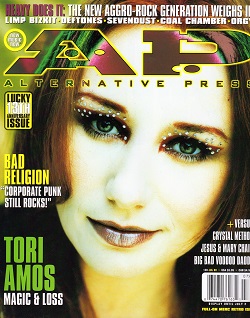 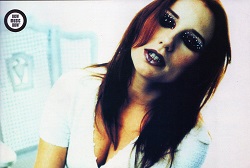
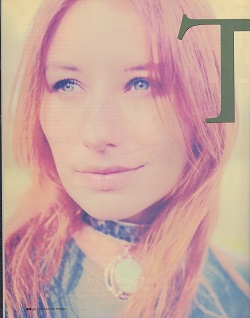 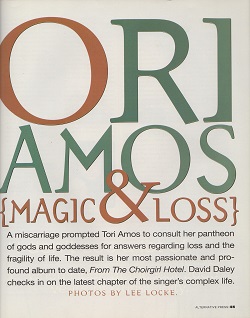
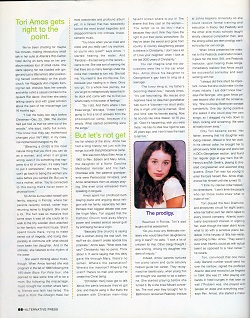 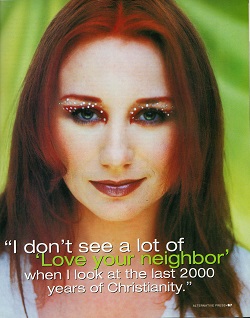
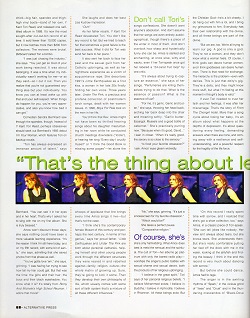 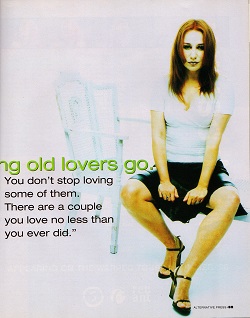
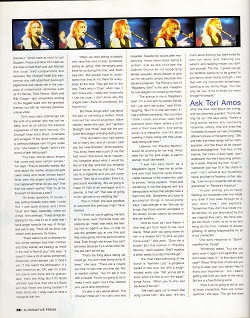 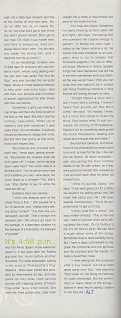
previously unseen photo from this session
from Alternative Press, September 2000
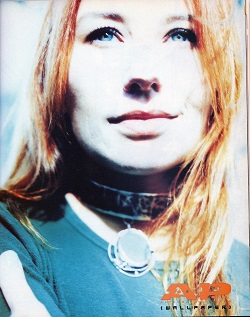
[scans by Sakre Heinze]
t o r i p h o r i a
tori amos digital archive
yessaid.com
|